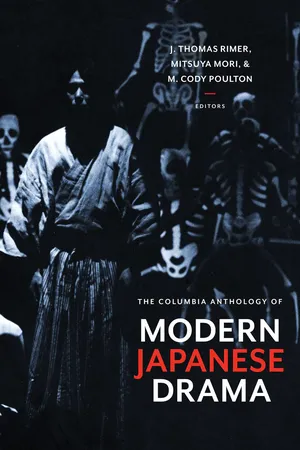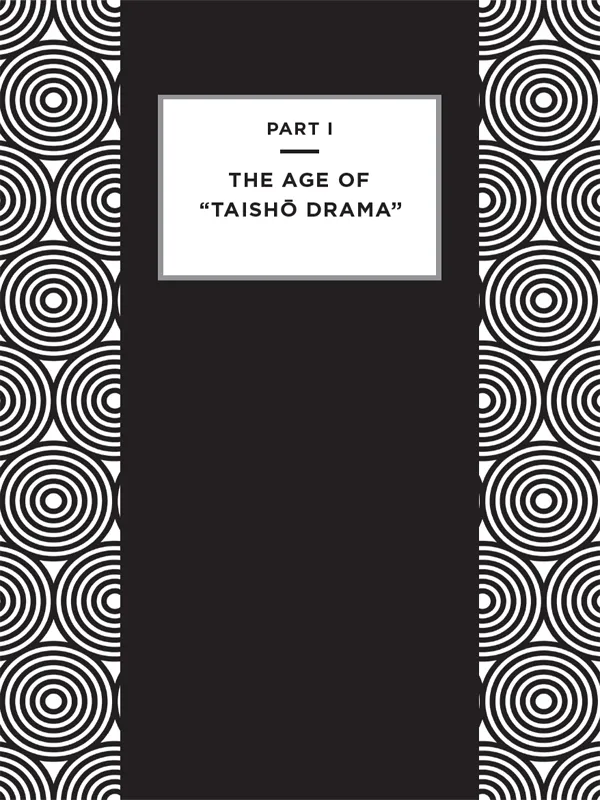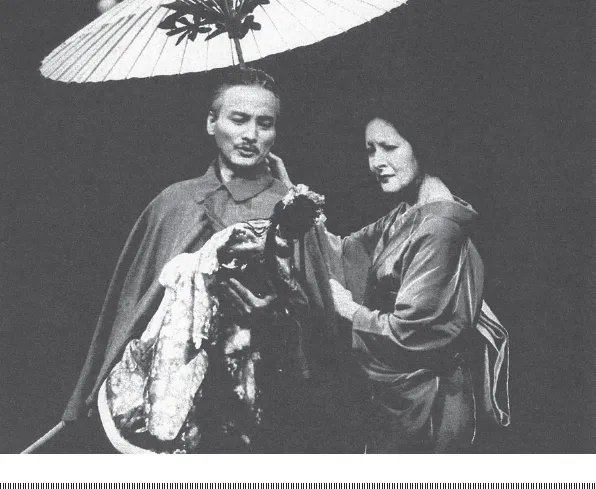![]()
![]()
KERRIA JAPONICA
IZUMI KYŌKA
TRANSLATED BY M. CODY POULTON
Izumi Kyōka, Kerria Japonica, directed by Nakamura Takao, Parco Part 3, September 1992.
Known for his rich and poetic prose style, Izumi Kyōka (1873–1939) wrote romances and fantasies that challenged the work of his contemporaries and that, with the rise of naturalism as a literary movement, tended to be simpler, more direct and realistic, and even autobiographical. Kyōka’s inspiration came from predominantly traditional sources—folklore, nō and kabuki theater, the illustrated fiction of the Edo era—but his literature already anticipated the decadent turn in Japanese culture in the Taishō era. He attracted an avid following of younger writers like Tanizaki Jun’ichirō and Kawabata Yasunari, and, even later, Mishima Yukio, Kara Jūrō, and Terayama Shūji. In fact, from as early as the mid-1890s, the shinpa theater adapted many of Kyōka’s novels to the stage. (See his Nihonbashi and a discussion of shinpa theater in part VI.) Primarily a novelist, as were many of his contemporaries, Kyōka also wrote many plays, mostly during the Taishō era. Many of these original works, like Demon Pond (Yasha ga ike) and The Castle Tower (Tenshu monogatari), are unbridled fantasies with supernatural characters and elements drawn from ghost stories and legends. Although most of them were never performed in his lifetime, thanks to revivals since the 1960s by the kabuki actor Bandō Tamasaburō V and various avant-garde stage artists like Ninagawa Yukio and Miyagi Satoshi, these plays have become the favorites of Kyōka’s works and are, in many respects, more accessible to a modern Japanese public than his fiction, which is difficult to read.
Kerria Japonica (Yamabuki, 1923) is an exception to much of Kyōka’s original work for the stage, in that all the characters are human, yet the play displays touches of the grotesque and decadent that can be found in his wildest fantasies. A favorite of Mishima Yukio, who said of it that all the people it portrays are in fact monsters, the play is a study of obsessive love. It was first staged in 1978.
How like a lovely woman fresh from her bath (her dark eyebrows, faint mountain crescents) are the white blooms of the kerria rose, strikingly pale against their deep green leaves damp with rain!
Time: The present. A morning in late April.
Place: A back alley in Shuzenji hot spring. Later, also in Shuzenji, a shortcut in the woods to the road to Shimoda.
Characters
An ARTIST, Shimazu Tadashi, forty-five or forty-six years old
A LADY, Nuiko, Viscountess Koitogawa, formerly the daughter of the proprietor of the restaurant Yukari, age twenty-five
A traveling PUPPETEER, Heguri Tōji, age sixty-nine
A YOUNG BOY and GIRL, festival pages. A SHOPKEEPER of a general store. A GROOM. Fourteen or fifteen VILLAGERS
SCENE 1
A general store. On one side are three double-petaled cherry trees in full bloom. Inside the closed glass doors of the store are a variety of products for sale: cotton batting, paper, bolts of cloth, dried shiitake mushrooms, patent medicines, soft drinks, and the like. In the earthen entrance, with its door open, are some chairs and a table laid with beer, juice, a keg of saké covered in straw matting, and a bottle of shōchū. Right beside the store is a rice paddy.
To the other side of the store is a hedge of cedar over a low stone wall, beneath which flows a small stream. Saffron flowers and weeds grow in the wall. Behind the hedge is a willow in fresh green leaf, its branches drooping over the path. A purple magnolia in blossom would also look good in the background. There is a path between the store and the hedge. The rice paddy, which has not yet been tilled, is covered with green waterweeds. Here and there bloom milk vetch and mustard blossoms. Following the path along the hedge, farther on is a bamboo grove and a tall zelkova tree, in whose shadows the path disappears up the mountain.
The PUPPETEER is seated, his back to the audience, at the squalid-looking table at the earthen storefront. As he speaks, he rubs his upper lip.
PUPPETEER: Master—Kind master! Pour me another, won’t you?
SHOPKEEPER (Enters the storefront from behind the glass partition): Why, there ain’t no need to be calling me “kind”! A simple sir will do me fine. (Smiles wryly.) Don’t you think the sun’s high enough yet, old man? How do you expect to make a living if you drink like that?
PUPPETEER: Hah, hah, hah. I’ve done with work for the day already. Pardon me for saying so, but once I’m through here, I’ll just stagger off to my little nest in the woods.
SHOPKEEPER: You needn’t tell me how unsteady your legs will be, but it’s a bit too early to be heading back to that nest of yours!—I have to mind the store today on me own, but this side of the bridge to the public baths don’t see much traffic compared to the crush of visitors in Shuzenji. Now’s when you ought to be making money.
PUPPETEER: Right you are. First the locals, then the pilgrims from all over the country—aunties and grannies, grandpas with their grandkids, swarms of them, black as the smoke rising from the ritual bonfires, undaunted by cloudbursts like the monsoons of summer.—And then, the boom! boom! of festival drums have drowned out the tinkle-tinkle coming from the little sideshow tents—why would anybody want to come way over here? Cross the bridge, and so long customers! Hah, hah!—I can ply my trade come evening and make some money, but I’ve earned enough right now for a drink or two, and I don’t need no more than that.—And if worse comes to worst, well then, just let me die here. (Bows deeply, bumping his head hard against the glass pane.)—Kind master, pour me another drink!
SHOPKEEPER: You’re just like a dying sailor begging Davy Jones to give him water. Maybe that’s where the expression “bottomless cup” came from…. Drink as much as you like. It’s my business, after all. (Wipes the neck of the bottle.)—Just don’t go smashing the merchandise there, old man.
PUPPETEER: Let me die in peace. (Gulps down the drink and laps up what’s left on the palm of his hand.) Besides, it’s the anniversary of the Saint’s death.—Reverend Kōbō, come pick me up and take me away in your automobile with its shiny gold trim!
SHOPKEEPER: It won’t be the saint that comes and takes you away, but the town hall, and there’ll be hell to pay for that. Easy with the alcohol there. (Starts to go inside.)
PUPPETEER (Shouting): Kind master, pour me another!
SHOPKEEPER: It’s the Feast of Saint Kōbō, so I won’t have my spuds turn into stones on account of you.1 … I hate to be stingy, so be my guest, drink as much as you like. But are you sure you finished the last drop of the one I just gave you?
PUPPETEER: So far, I knocked back five cups. I drank to the snow … and now I drink to the blossoms…. Kind master, three cherries grow under your eaves…. Young trees but in full bloom…. There ain’t another house in Shuzenji that can boast such blossoms.—And it costs me nothing to look at ’em. The drink costs me dear, but still this is a fine sight. Damn, that’s good!
SHOPKEEPER: Don’t spout nonsense. You’re drunk, old man….
PUPPETEER: Why, just the occasional cup or two is a libation for the cherries, to ensure they blossom better. A blessing from Saint Kōbō himself!
SHOPKEEPER: Cut the cheap compliments.—It’s awful how nobody passes this way…. Just two children a while back, in a procession over the mountain from Tatsuno, and nobody else since then, not even a horse and his groom.—It’s such a bore having to mind the shop.—Ah, I can hear the drums!
(The drums are the kind held up on a pole by two musicians who beat them in turn on both sides. The sound—boom! baboom! boom!—can be heard dimly in the distance.)
PUPPETEER: The pipes and flutes, men in form...





